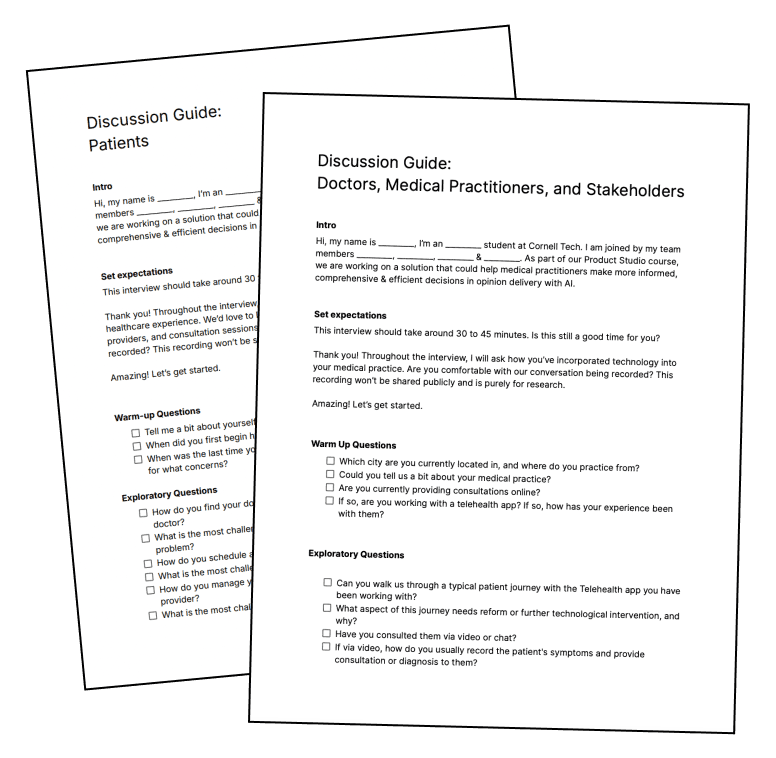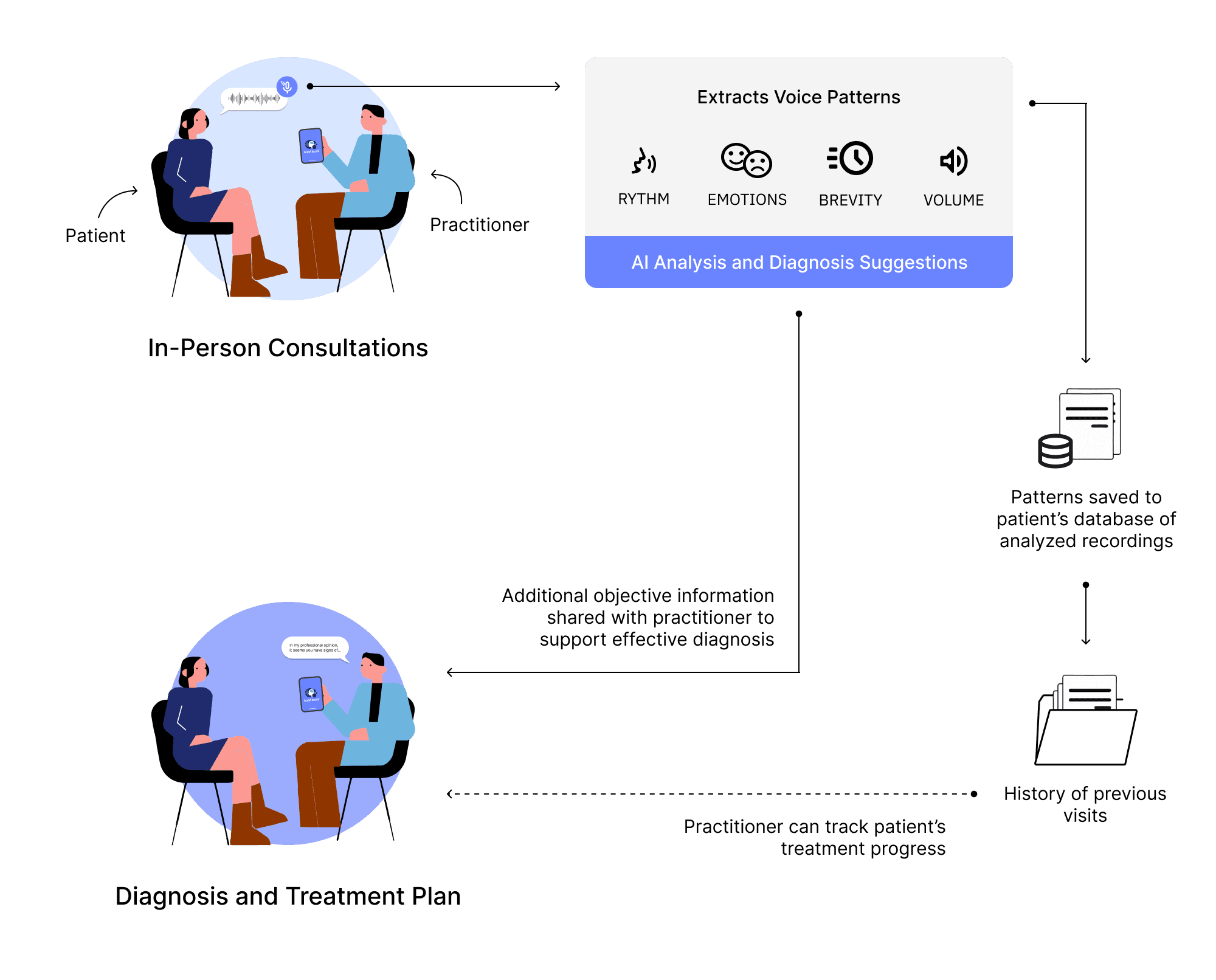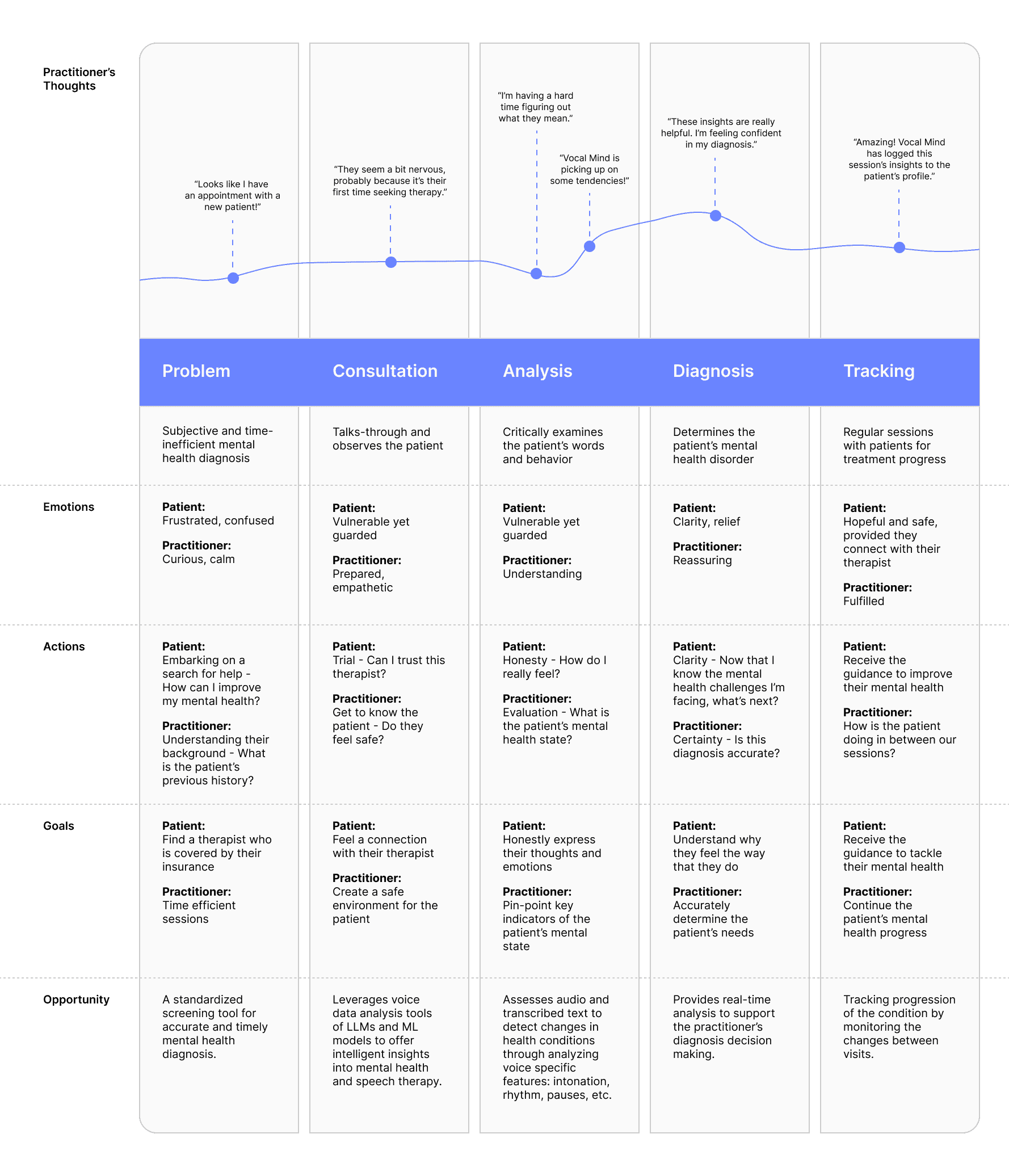Team
Self, Product Designer
Dobko and Nirmal, Developers
Wu, Product Manager
Rajabi, Company Advisor
Timeline
16 weeks
Cornell Tech
Product Studio
Area
UX Research

Challenge
An accurate mental health diagnosis can take weeks or even years to determine.
This is partly because diagnoses vary from person to person; some might have one, while others have quite a few. Mental health symptoms can often affect self-care, life skills, and relationships, so it's essential for the patient to receive a diagnosis, which is the first step to treatment.
$33.1bn
Mental health market size in 2023, expected to grow 3% annually.
IBIS World
6.1%
CAGR for the evolution, diagnosis, and treatment of communication disorders
Fortune Business Insight
90%
Of hospitals are projected to use AI-driven tech for early diagnostics
CBI Insight

Discovery
How is tech currently integrated into healthcare processes?
Research Method 01: Secondary Research
We researched the stakeholder ecosystem, current patient experience, and technological advancements to get a clear picture of the complex systems within the healthcare industry. We identified a trend in integrating tech into diagnostics.
system mapping
How do patients and doctors use and view tech in healthcare?
Research Method 02: User Interviews
I led the creation of our interview guides with 5 doctors, 5 patients, and 2 medical students. For doctors, we aimed to understand how tech is used in their practices and their feelings towards AI. For patients, we sought to learn about their diagnosis and treatment experience.
Interview guides
What did we learn from our research?
Key Insights
Doctors lack standardized tools
Variability in mental health diagnostics criteria and limitations of subjective screening tools can lead to delayed or misdiagnosis.

Patients struggle to articulate emotions
Patients may face difficulties articulating or expressing their emotions, which slows or prevents timely diagnosis.

Narrowing the Scope

Testing
To validate our product's technological feasibility and key desirability, we conducted risky assumption testing.
I collaborated with engineers and a product manager to identify and address the most uncertain and high-impact assumptions early on in the process. We were able to prioritize critical features and reduce the risk of building something that doesn’t resonate with users or meet technical requirements, increasing the chances of its success.
Focus Area
AI for Speech and Tone Analysis
Tech Usability
Assumptions
Mental Health Affects Speech Patterns
People Speak Normally When Recorded
Clinical guideline for mental healthcare diagnostics
Our questionnaire that we sent to participants
Assumption 01:
Mental Health Affects Speech Patterns
Ten people were enlisted to complete a week-long experiment in which they filled out a mood tracker and sent audio recordings about their day. Our questionnaire was modeled on the clinical guidelines for mental health diagnosis. We interpreted the recordings using an existing speech behavior analysis API by Humane AI.
Participant's Mood Tracker Answers
Voice Sentiment Analysis AI API
There is a significant and useful correlation found between the participants’ inputs from the mood tracker and API analysis.
Day 1
“Confident and focused”
Day 2
“Tired, bit stressed, and focused”
Day 3
“Felt confident”
We identified consistency in the AI’s insights throughout the experiment.
Assumption 02:
People Speak Normally When Recorded
We compared the answers and mannerisms of interviewees while initially speaking unrecorded and after we began recording the conversation. The participants were randomly selected, unaware of the purpose of the research, and did not know ahead of time that they would be asked to be recorded halfway.
80% had no significant voice change
We inferred the changes in speech patterns were minimal and wouldn't drastically affect the accuracy of the analysis.
75% took longer pauses as the conversation continued.
We took these pauses as an indicator that participants felt more comfortable the more they spoke with us.

Final Solution
user journey

Reflections
Collaboration is the key to success.
I thoroughly loved collaborating with my team as each of our unique perspectives was valued throughout the development process. We were able to thoughtfully consider the user's needs, the tech needed to make our solution feasible, and the roadmap for our product launch. This genuine involvement and curiosity led to a meaningful solution, and we were selected as 1 of 9 teams from a cohort of 80 groups to pitch to Cornell Tech faculty and partners.
A big thank you to my amazing teammates and advisor!
Last updated February 2025
Socials
Navigation

















